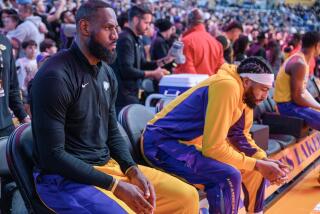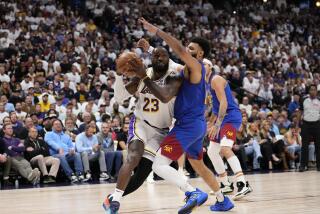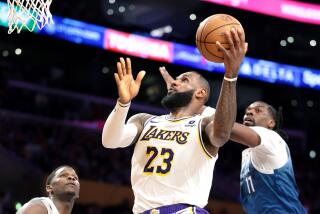Profiles of the Lakers
- Share via
A quick look back at this season’s performance by the 13 players on the Lakers 2009-10 championship team:
Kobe Bryant: He had another stellar regular season, averaging 27 points – fourth best in the NBA —- 5.4 rebounds and 5.0 assists. He finished third in the NBA’s most valuable player award voting, which was a surprise because he didn’t get any first-place votes. He finished behind Cleveland’s LeBron James and Oklahoma City’s Kevin Durant.
Bryant played in 73 games, injuries finally taking a toll. He suffered a strained ligament and a fractured right index finger that he was forced to play with through the majority of the season. He also had a left ankle sprain that caused him to miss five games.
During the first round of the playoffs, Bryant had been struggling with a problem in his right knee until he had 1 ¼ ounces of fluid drained from it. He then began to step his game up, playing some of his best basketball from the second round through the NBA Finals.
Bryant was his typical surly playoff self during the Finals. Though he was named MVP of the Finals for the second straight year, Bryant struggled with his offense in Game 7, missing 18 of his 24 shots. But he finished the night with 23 points and 15 rebounds and won his fifth NBA championship, the same as Magic Johnson, and one behind Michael Jordan.
Derek Fisher: Fisher played all 82 regular-season games for the fifth consecutive season. He has played in 413 consecutive regular-season games, second among all active NBA players.
Still, Lakers’ fans voiced their displeasure with Fisher whenever one of the NBA’s quicker point guards had good games against him. Fisher and the Lakers seemed to have trouble stopping teams in the pick-and-roll, and he was faulted for that many times by Lakers’ fans. But Fisher never complained. He just stayed the consummate professional he has been throughout his 14 years in the league.
Fisher, 35, was never the quickest point guard, but he was steady – on the court and in the locker room. He was the one player who always could talk to Bryant and Fisher was an inspirational leader.
He averaged 7.5 points per game during the regular season and shot just 38% from the field, and a respectable 34.8% from three-point range.
However, Fisher again was a leader for the Lakers during the playoffs.
In Game 7 of the NBA Finals against the Boston Celtics, with the Lakers trailing by four points entering the fourth quarter, Fisher got in the huddle and encouraged his teammates. Then he came through with another big shot, making a three-pointer with 6:12 left, tying the score at 64-64.
Andrew Bynum: It was another injury-marred season for the Lakers 22-year-old center. During his five seasons in the NBA, Bynum has played all 82 regular-season games just once. He played in just 65 regular season games this season, missing games because of a left Achilles’ strain, a strained right elbow and a bruised right hip.
When Bynum did play, he was a presence because of his seven-foot, 285-pound frame. He averaged a career-best 15 points, 8.3 rebounds and 1.45 blocks during the regular season while playing a career-best 30.4 minutes. He recorded 21 double-doubles. He made 57% of his field goals, fifth best in the NBA.
Bynum impressed his teammates, Lakers’ fans, the media and team management by playing through a torn cartilage in his right knee in the playoffs. He twice had his knee drained of fluid in about a two-week period during the NBA Finals because he wanted to play and beat the Boston Celtics. Bynum struggled at times during the Finals, but was able to play in every game and provide the Lakers with a lift at times.
He’s due to have surgery on his knee this summer.
Pau Gasol: It was a slow start to the regular season for Gasol. He missed the first 11 games because of strained right hamstring and then he missed six games in January with a strained left hamstring. Gasol played 65 regular-season games.
Gasol was outstanding once again for the Lakers, easily the second-best player on the team. He averaged a double-double, scoring 18.3 points and grabbing 11.3 rebounds in the regular season. He posted 40 double-doubles during the season. He made the NBA All-Star team again and is considered one of the most skilled and talented big men in the league.
There were times during the regular-season when Gasol spoke out, saying the Lakers needed to get the ball inside more. That showed another side of Gasol.
Gasol came up big for the Lakers in the playoffs. He scored a game-winning put-back in Game 6 of the Western Conference first-round series to eliminate the Oklahoma City Thunder.
He didn’t shoot the ball well in Game 7 of the NBA Finals – Gasol was just six-for-16 – but he was a beast on the backboards, collecting 18, including nine offensive rebounds.
Gasol showed some toughness, leaving many to say he had shed his “softness” label.
Ron Artest: The debate raged for quite a while: Was Artest, who signed a five-year, $34 million free-agent deal with the Lakers last summer, a better fit than Trevor Ariza, who signed a similar deal in Houston? Artest averaged just 11 points per game during the regular season, the lowest of his 11-year career.
He also shot just 41.4% from the field, 29.6% from three-point range. Even his free-throw shooting was poor: Artest made just 68.8% of his free throws.
It got so bad that Lakers’ fans begged Artest not to shoot the basketball. He never seemed to get a total grip of the triangle offense.
But the one thing Artest did do was play great defense all season. His job was to slow down small forwards like LeBron James, Kevin Durant, Carmelo Anthony and Paul Pierce.
Artest did his job, especially in the NBA Finals.
He had a couple of rough games in the Finals, but many said Artest was the best player on the court in the decisive Game 7. Artest had 20 points, five rebounds and three steals. He hounded Pierce into going five-for-15 from the field in Game 7.
After Artest helped the Lakers win the championship, the consensus was that he was the right fit.
Lamar Odom: It was another baffling, frequently inconsistent season by Odom. This time, however, he seemed to play better in his role as the team’s sixth man for the second consecutive season. It was Odom’s job to be the leader of the Lakers’ bench.
He averaged just 10.8 points per game, the lowest of his 11-year career, plus 9.8 rebounds and 3.3 assists in the regular season. He scored in double figures 44 times. He did play in all 82-regular season games, the first time he has done that in his career. He started 38 times when either Andrew Bynum or Pau Gasol couldn’t play because of injuries. The Lakers many times wished Odom could fill of the stat line across the board more often.
Odom still is considered one of the more versatile players in the NBA. Because of his ball handling skills, Odom was able to facilitate the offense for the Lakers.
He played most of the season with a sore left shoulder and injured right knee. Odom was up and down in the post season. There games in which he wasn’t productive and there were games in which he was a key player.
Odom scored in double figures in just two of the seven NBA Finals game. But he was active in Game 7, providing the Lakers with a lift.
Jordan Farmar: The Lakers coaches liked his ability to change the game with his speed. But the Lakers staff didn’t like that he often dribbled the basketball too much and didn’t run the triangle offense frequently enough.
His defense was up and down. But the Lakers did like his hustle. Farmar averaged 7.2 points and shot 43.5% from the field.
Shannon Brown: He became known for his dunking exploits. But Brown wanted fans to know he was more than just a dunker. He was one of the best athletes in the NBA.
He averaged a career-best 8.1 points per game on 42.7% shooting from the field, but just 32.8% on his three-point shooting. He still needs to work on his guard skills.
Sasha Vujacic: Vujacic did not have a good season. He averaged a career-low 2.8 points. His 30.9% three-point shooting was the worst since his rookie year. He only played in 67 regular-season games and had to work his way out of Phil Jackson’s doghouse.
But he did make two big free throws late in Game 7 of the NBA Finals.
Luke Walton: A pinched nerved kept Walton out of 28 regular-season games. Overall, he played in a career-low 29 games, averaging just 2.4 points, tying his career-low from his rookie season.
The Lakers coaching staff liked Walton’s ability to find open teammates. He was one of the better passers on the team.
Josh Powell: The Lakers had hoped he could be an effective fourth big man this season. But Powell struggled in that role. He played in just 63 games and averaged just 2.7 points. He extended his shooting range out to the three-point line, making 43.8% (seven-for-16).
Adam Morrison: He spent most of the time on the inactive list. Known as a shooter, Morrison made just 37.6% of his shoots. But he appeared in only 31 games and averaged a career-low 2.4 points.
DJ Mbenga: Mbenga became one of the Lakers’ fans favorites. But the 7-0 center played in just 49 games and averaged just 2.1 points. He was at his best in practice, providing a physical presence for Andrew Bynum and Pau Gasol.
twitter.com/BA_Turner
Lakers win! Buy championship merchandise here
Clicking on Green Links will take you to a third-party e-commerce site. These sites are not operated by the Los Angeles Times. The Times Editorial staff is not involved in any way with Green Links or with these third-party sites.
More to Read
All things Lakers, all the time.
Get all the Lakers news you need in Dan Woike's weekly newsletter.
You may occasionally receive promotional content from the Los Angeles Times.










